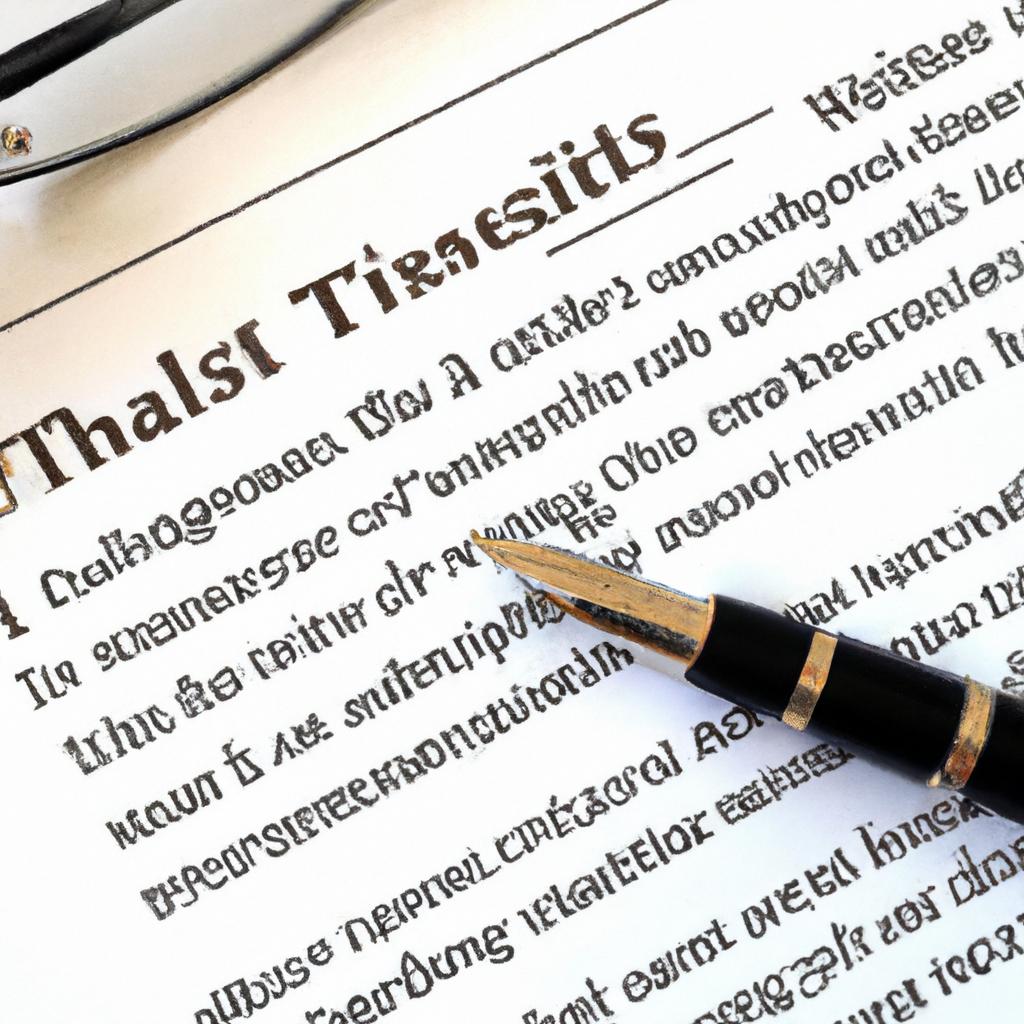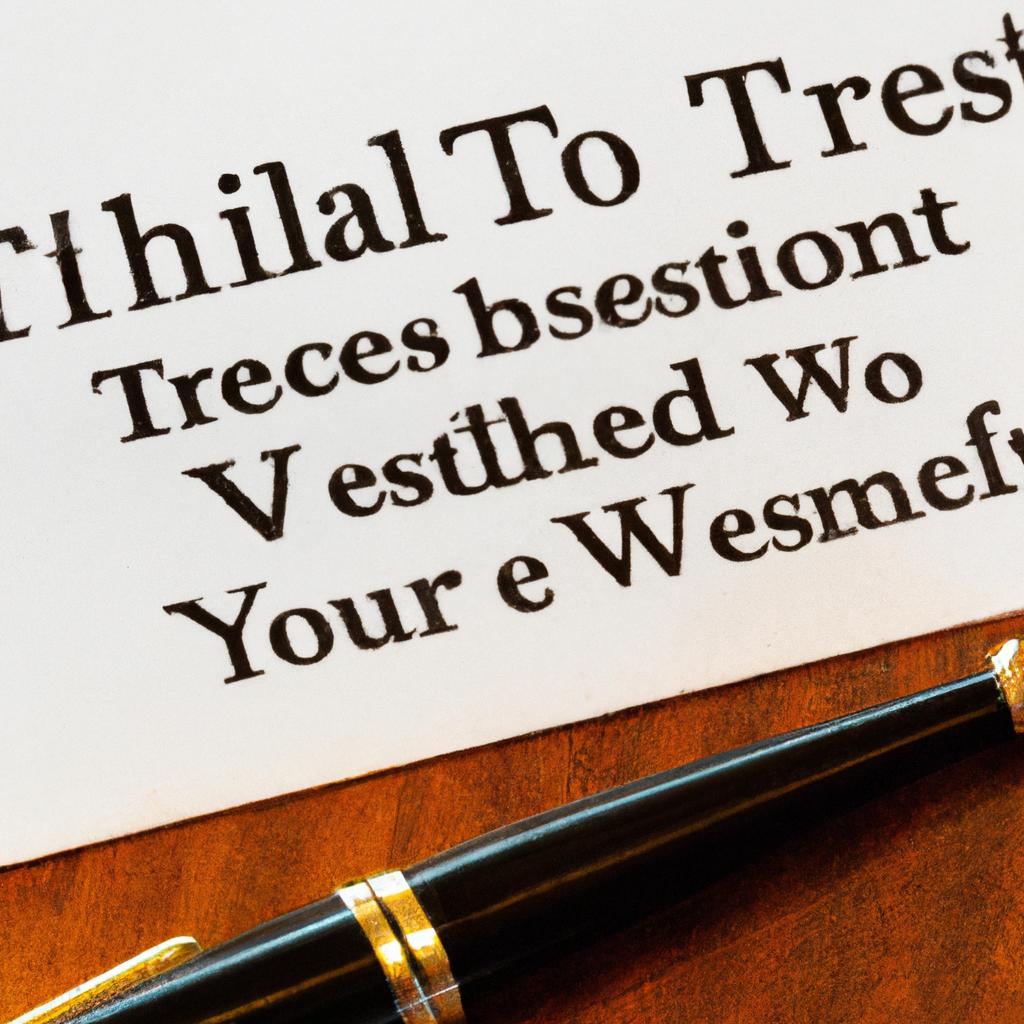In the intricate world of estate planning, the role of a trustee is one that holds immense importance. Tasked with overseeing the distribution of assets according to the wishes outlined in a will, a trustee is not simply a passive figure, but a key player in ensuring that one’s legacy is carried out with precision and care. At Morgan Legal Group, located in the bustling metropolis of New York City, our team of experienced attorneys specialize in navigating the complexities of estate planning, probate, elder law, Wills, and trusts. Join us as we delve into the pivotal role of a trustee, the individual entrusted with the responsibility of bringing a testator’s final wishes to fruition.
Understanding the Role of a Trustee in the Will Writing Process
When it comes to the will writing process, the role of a trustee is crucial in ensuring that the wishes of the testator are carried out as intended. A trustee is a person who is appointed to manage the assets and property outlined in the will on behalf of the beneficiaries. They have a fiduciary duty to act in the best interests of the beneficiaries and to follow the instructions laid out in the will.
Being a trustee comes with a great deal of responsibility and requires a thorough understanding of estate law. Trustees are legally obligated to administer the estate in accordance with the terms of the will, which may include distributing assets, paying debts and taxes, and managing investments. It is important for the trustee to be organized, reliable, and capable of making sound financial decisions. Additionally, they must keep detailed records of all transactions and be prepared to be held accountable for their actions.

Key Responsibilities of a Trustee When Drafting a Will
When acting as a trustee in the drafting of a will, it is crucial to understand the key responsibilities that come with this role. A trustee is entrusted with the important task of ensuring that the wishes of the testator are accurately reflected in the will, while also following all legal requirements and guidelines.
Some of the include:
- Understanding the testator’s wishes: It is essential for the trustee to have a clear understanding of what the testator wants to include in their will. This involves careful communication with the testator to ensure that their wishes are accurately captured.
- Adhering to legal requirements: A trustee must ensure that the will complies with all legal requirements, such as proper witnessing and notarization. Failure to adhere to these requirements can result in the will being deemed invalid.

Importance of Selecting a Trustworthy and Reliable Trustee
When it comes to estate planning, the selection of a trustee is a critical decision that should not be taken lightly. A trustee is the individual responsible for carrying out the wishes outlined in a person’s will after their passing. It is essential to choose a trustee who is not only trustworthy but also reliable to ensure that your final wishes are executed precisely as you intended.
Having a dependable trustee can provide peace of mind knowing that your assets and property will be managed and distributed according to your wishes. A trustworthy trustee will prioritize your best interests and act in a responsible and ethical manner. They will also have the necessary skills and knowledge to handle complex financial matters and legal responsibilities.

Considerations When Appointing a Trustee for Your Will
When appointing a trustee for your will, it is crucial to consider several key factors to ensure your wishes are carried out effectively. A trustee plays a vital role in administering your estate and distributing assets to beneficiaries. Here are some considerations to keep in mind:
- Trustworthiness: Choose someone you trust implicitly to handle your affairs with integrity and honesty.
- Responsibility: Look for a trustee who is organized, reliable, and capable of managing complex financial matters.
- Communication: Select someone who is a good communicator and can effectively convey your wishes to beneficiaries.
| Consideration | Importance |
|---|---|
| Trustworthiness | High |
| Responsibility | High |
| Communication | Medium |
Additionally, consider the potential trustee’s availability, financial acumen, and willingness to take on the responsibilities of the role. It is also essential to discuss your decision with the chosen trustee beforehand to ensure they are willing to accept the responsibility. By carefully selecting a trustee for your will, you can have peace of mind knowing that your estate will be managed according to your wishes and in the best interests of your beneficiaries.
Q&A
Q: What is a trustee and what role do they play in the process of writing a will?
A: A trustee is a person who is designated to manage the assets and property of a deceased individual according to the terms outlined in their will. They ensure that the wishes of the deceased are carried out effectively.
Q: Is it necessary to have a trustee when writing a will?
A: While it is not mandatory to have a trustee when creating a will, having one in place can provide added security and peace of mind that your assets will be managed and distributed appropriately after your passing.
Q: Can anyone be designated as a trustee in a will?
A: Yes, anyone can be named as a trustee in a will, but it is important to choose someone who is responsible, trustworthy, and capable of carrying out the duties required of them.
Q: What are some common responsibilities of a trustee in relation to a will?
A: Some common responsibilities of a trustee include managing the assets and property of the deceased, distributing assets to beneficiaries as outlined in the will, paying off any outstanding debts or taxes, and ensuring that the wishes of the deceased are upheld.
Q: Can a trustee also be a beneficiary in a will?
A: Yes, it is possible for a trustee to also be named as a beneficiary in a will, but it is important to carefully consider any potential conflicts of interest that may arise from this arrangement.
To Conclude
In conclusion, the role of a trustee in the estate planning process is crucial in ensuring that your wishes are carried out according to your will. By appointing a responsible and trustworthy individual to act as your trustee, you can have peace of mind knowing that your assets and affairs will be managed and distributed as you intended. So, take the time to carefully consider who you choose as your trustee, as they will play a pivotal role in ensuring your legacy lives on for generations to come. Thank you for reading!
 Trustees play a crucial role in the creation and execution of a will. They are the individuals responsible for carrying out the wishes of the person who wrote the will, also known as the testator. This person is usually a close family member or friend, who is entrusted with the responsibility of protecting and distributing the assets of the deceased according to their wishes. In this article, we will dive deeper into the role of a trustee in the context of writing a will, why it is essential to choose the right person for this role, and the benefits and practical tips for selecting a trustee.
Trustees play a crucial role in the creation and execution of a will. They are the individuals responsible for carrying out the wishes of the person who wrote the will, also known as the testator. This person is usually a close family member or friend, who is entrusted with the responsibility of protecting and distributing the assets of the deceased according to their wishes. In this article, we will dive deeper into the role of a trustee in the context of writing a will, why it is essential to choose the right person for this role, and the benefits and practical tips for selecting a trustee.
What Is a Trustee?
A trustee is a person who is designated to manage and oversee the assets and properties left behind by the deceased person, also known as the trustor. They hold a fiduciary duty to manage and distribute these assets according to the instructions laid out in the trust document or will. A trustee can also be referred to as an executor or personal representative, depending on the state’s governing laws.
The Role of a Trustee in Writing a Will
A trustee is an integral part of the process of writing a will. They are named specifically in the document to ensure that the testator’s wishes are carried out efficiently and effectively. Here are some essential duties and responsibilities of a trustee in the will-writing process.
1. Protecting the Testator’s Assets
The primary responsibility of a trustee is to protect the assets and properties left behind by the testator. This includes managing and preserving the assets until they are distributed to the beneficiaries named in the will. A trustee must handle these assets with utmost care and ensure that they are not wasted or misused in any way.
2. Administering the Estate
A trustee’s duties also include executing the terms of the will and managing the estate’s financial matters. This includes collecting any debts owed to the estate, paying off any outstanding debts or taxes, and distributing the remaining assets to the beneficiaries according to the will’s instructions.
3. Communicating with Beneficiaries
A trustee is responsible for communicating with the beneficiaries named in the will and keeping them informed about the distribution process. They must also provide a detailed account of all financial transactions and decisions related to the estate.
4. Making Legal and Financial Decisions
A trustee is also responsible for making legal and financial decisions on behalf of the estate. This includes handling any legal disputes or challenges to the validity of the will and managing any investment decisions related to the estate’s assets.
Why Choosing the Right Trustee is Crucial
Selecting the right trustee is crucial for ensuring that the testator’s wishes are carried out according to their instructions. This means choosing someone who is trustworthy, responsible, and has the necessary knowledge and skills to manage and distribute the estate’s assets.
A trustee must also be someone who is willing and able to handle the responsibilities that come with the role. They may have to make difficult decisions and face challenges during the process, so it is essential to select someone who can handle the pressure and act in the best interest of the estate.
Benefits of Choosing a Trustee
1. Peace of Mind
One of the main benefits of choosing a trustee is the peace of mind that comes with knowing that your assets will be managed and distributed according to your wishes. This can be especially comforting for those who have complex family or financial situations and want to ensure that their assets are protected and distributed fairly.
2. Avoiding Family Conflicts
Selecting a trustee can also help avoid family conflicts and disputes over the distribution of assets. A neutral third-party can handle the responsibilities of managing the estate, minimizing the potential for disputes and disagreements among family members.
3. Efficient Estate Administration
A trustee’s knowledge and experience in handling estate matters can also lead to a more efficient and effective administration process. This can save time and money for the beneficiaries and ensure that the estate is distributed in a timely manner.
Tips for Choosing a Trustee
1. Think Carefully About Your Options
Choosing a trustee is a significant decision, and it is essential to think carefully about your options. Consider individuals who have your best interests at heart and who you trust to carry out your wishes.
2. Consider Professional Help
In some cases, it may be beneficial to choose a professional trustee, such as an attorney or financial advisor, to manage your estate. This can provide an added layer of expertise and competence in handling complex estate matters.
3. Discuss with Potential Trustee
Before naming someone as a trustee in your will, it is essential to discuss the role with them and ensure they are willing and able to take on the responsibilities. This can also help to avoid any misunderstandings or conflicts in the future.
Conclusion
A trustee plays a critical role in the will-writing process and holds a significant amount of responsibility in managing and distributing a deceased person’s assets and properties. It is essential to carefully consider the options and select the right person for this role to ensure that your assets are protected and distributed according to your wishes. We hope this article provided valuable information on the role of a trustee in writing a will and the importance of choosing the right person for this role.

